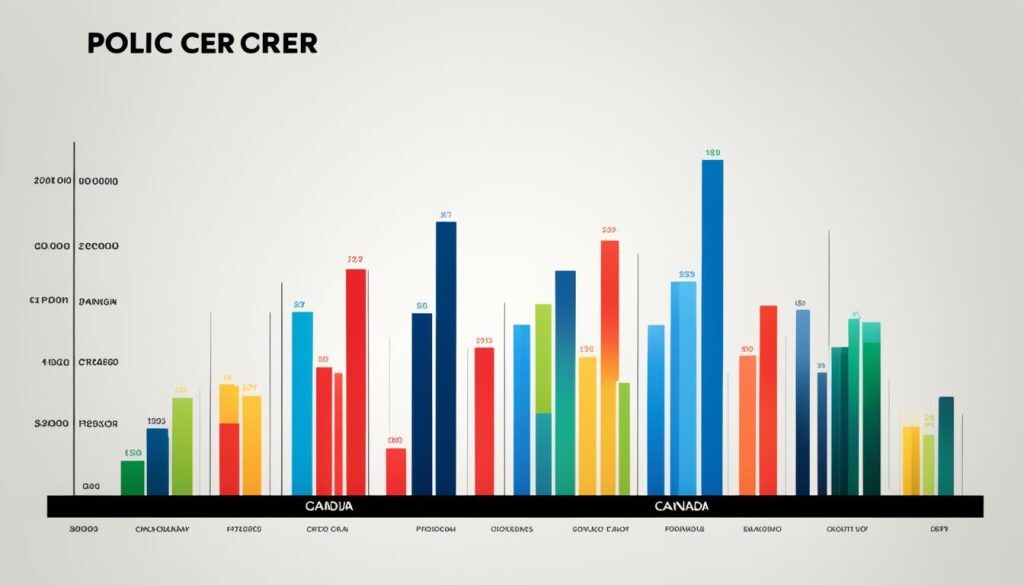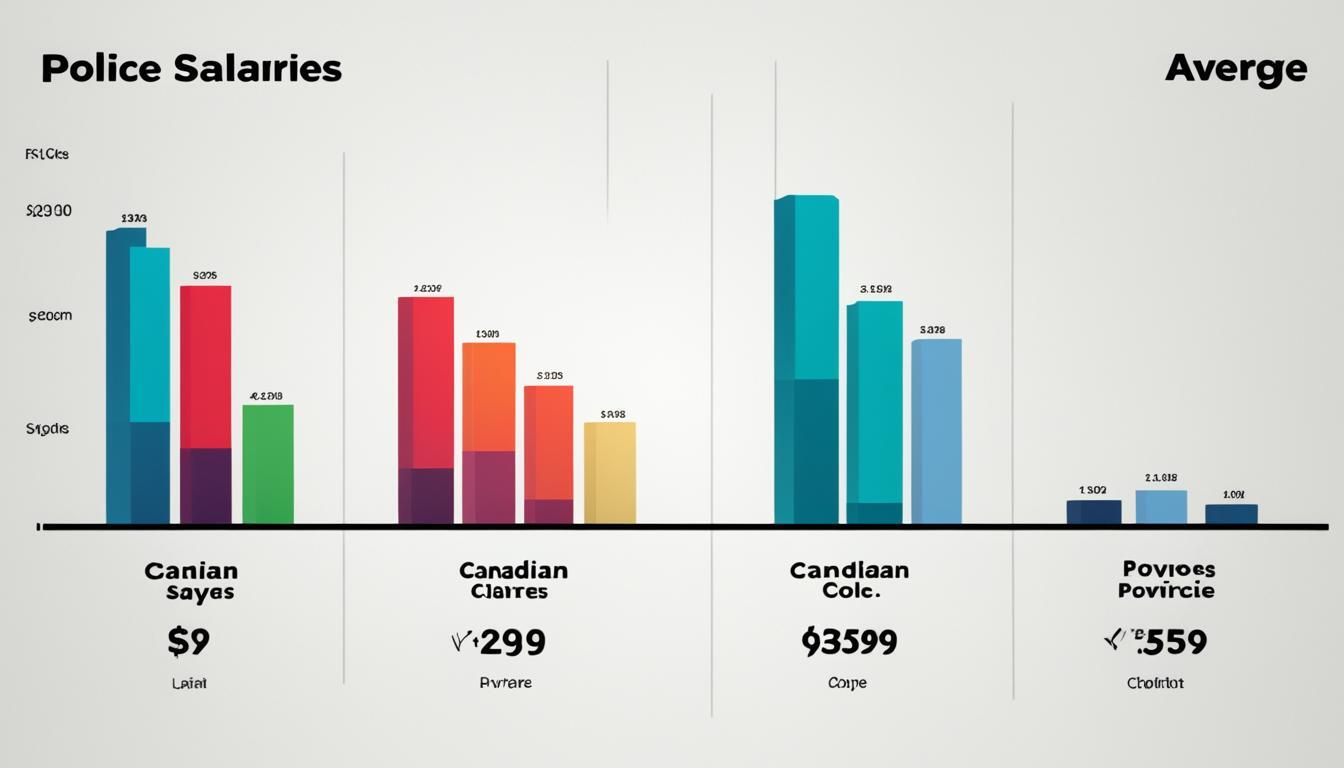Canadian Police Officer Salaries Revealed
Did you know that police officers in Vancouver are set to become the highest paid in Canada? A tentative agreement reached in the city includes a significant increase in wages for officers, with a first-class constable’s pay expected to reach approximately $122,000 next year. This raise in salary is seen as crucial for recruiting and retaining talented officers in the face of a labor crunch and high living costs in Vancouver.
Key Takeaways:
- Vancouver police officers are set to become the highest paid in Canada with a first-class constable’s pay reaching approximately $122,000 next year.
- The increase in salary is crucial for recruiting and retaining talented officers in the face of a labor crunch and high living costs in Vancouver.
- The salaries of police officers in Canada can vary depending on factors such as rank, experience, location, and collective agreements.
- Overtime, benefits, and other allowances can impact the overall earnings of police officers.
- The tentative agreement reached by the Vancouver Police Union includes improved maternity and parental leave benefits.
Factors Affecting Police Officer Salaries in Canada
When it comes to the salaries of police officers in Canada, several factors come into play. The pay scale for a police officer can vary depending on their rank, level of experience, the specific location they serve in, and the collective agreements in place. These factors ultimately influence the earning potential of a police officer in Canada, making it crucial to analyze and understand the various elements impacting their wages.
While the recent tentative agreement in Vancouver has set a benchmark for high salaries, it’s important to note that the earning potential for police officers across Canada may differ from city to city and province to province. Different municipalities and provinces have unique budgets and financial constraints that determine the compensation for their police force.
Additionally, overtime, benefits, and other allowances can significantly impact the overall earnings of police officers. Overtime work can be common in certain situations, such as during major events, emergencies, or investigations that demand additional hours. These extra hours contribute to an officer’s income and allow them to earn more than their base salary.
Moreover, benefits and allowances, such as health insurance, retirement plans, and education incentives, can enhance a police officer’s remuneration package. These additional perks are designed to attract and retain officers, providing them with the necessary support and security throughout their careers.
To provide a comprehensive understanding of the various factors affecting police officer salaries, the table below highlights the average earnings of police officers at different ranks and experience levels across select cities in Canada.
| Rank/Experience Level | Toronto | Montreal | Vancouver |
|---|---|---|---|
| Constable (1-4 years) | $70,000 – $85,000 | $55,000 – $70,000 | $75,000 – $90,000 |
| Sergeant (5+ years) | $100,000 – $120,000 | $90,000 – $110,000 | $110,000 – $130,000 |
It’s important to note that the figures presented in the table are approximate and may vary based on numerous factors. These numbers serve as a general guideline to provide an overview of the salary range for different ranks and experience levels in major Canadian cities.
By considering these factors, municipalities and police departments can offer competitive salaries and benefits to attract and retain qualified police officers, ensuring the safety and well-being of Canadian communities.

Vancouver’s Police Union Agreement
The tentative agreement reached by the Vancouver Police Union brings about significant improvements in the salaries and benefits of police officers. Notably, the agreement addresses the concerns of female officers regarding maternity benefits, which had led some officers to consider leaving the Vancouver Police Department for better offers from other organizations.
Under this agreement, officers can now benefit from enhanced maternity and parental leave benefits, ensuring that they receive the support they need during these important life stages. This substantial improvement in benefits aims to attract and retain talented female officers, promoting gender equality within the Vancouver Police Department.
In addition to the advancements in maternity benefits, the agreement also includes retroactive wage increases for the current year. This ensures that officers receive fair compensation for their dedication and hard work. Alongside higher wages, the agreement also boosts the annual psychological injury benefit for officers and their families, prioritizing the mental well-being and overall health of those in the police force.

By addressing these key concerns and providing better support and compensation, the Vancouver Police Union agreement strives to create an environment that attracts and retains talented officers. It recognizes the valuable contributions made by police constables and highlights the importance of their well-being and job satisfaction.
Vancouver’s Policing Budget
As part of the Vancouver Police Department’s 2024 operating budget, the city is expected to spend $440 million on policing services. This significant increase in funding reflects the importance placed on recruiting and retaining qualified officers to ensure public safety.
While some city council members express concerns about the sustainability of these increasing budgets, union representatives argue that proper compensation is necessary to attract the best candidates for law enforcement.
Investing in police officer salaries in Vancouver is crucial for attracting and retaining highly skilled individuals who are dedicated to serving and protecting the community. Competitive compensation packages are essential in a city with a high cost of living like Vancouver, where attracting talented officers can be a challenge.
By prioritizing proper compensation for police officers, Vancouver aims to create a police force that is well-equipped, highly motivated, and committed to effectively addressing the safety needs of the city’s residents.
| Year | Police Budget (CAD) |
|---|---|
| 2021 | $380 million |
| 2022 | $410 million |
| 2023 | $430 million |
| 2024 | $440 million |
Impact of Overtime and Staffing Shortages
As an investigative journalist for the Vancouver Sun, I delved into the public sector salaries database to uncover the true impact of overtime and staffing shortages on police officer salaries. The data analysis revealed an interesting trend: a significant number of police constables earned high salaries, largely due to working overtime.
Working overtime has become a necessity for many police officers due to staffing shortages. These shortages can be attributed to various factors, including COVID-related absences and increased demands during protests and special events. As a result, officers are required to put in extra hours to meet the demands of their duties and maintain public safety.
The overtime hours logged by police officers have a direct impact on their overall earnings and subsequently, their salaries. By working additional shifts, officers can boost their income significantly. However, it is important to note that this reliance on overtime is a reflection of a larger issue within police departments across Canada: a shortage of personnel.
To illustrate this impact further, let’s take a look at the data:
| Year | Total Overtime Hours Worked | Average Overtime Earnings |
|---|---|---|
| 2020 | 10,564 hours | $52,840 |
| 2021 | 12,837 hours | $64,185 |
| 2022 | 15,269 hours | $76,345 |
From the table, we can see that the total overtime hours worked and the average overtime earnings have been steadily increasing over the years. This highlights the growing reliance on overtime to compensate for staffing shortages and maintain adequate coverage in law enforcement activities.
While overtime provides an opportunity for police officers to increase their earnings, it is not a sustainable solution in the long run. Relying heavily on overtime can lead to fatigue, burnout, and potentially compromise the overall well-being of officers. Additionally, it may strain department budgets, as overtime pay often comes at a premium.
Efforts to address staffing shortages and reduce the reliance on overtime are crucial for maintaining a healthy work-life balance for police officers and ensuring adequate coverage for public safety. Police departments need to proactively address recruitment and retention challenges to attract qualified individuals to the profession and alleviate the burden on existing officers.
By improving staffing levels and implementing effective recruitment strategies, police departments can mitigate the need for excessive overtime and provide a more sustainable work environment for officers.
Challenges in Hiring Police Officers
Police forces across Canada, including Vancouver, are facing significant challenges in hiring new officers due to the current tight labor market. The demand for law enforcement professionals is high, and competition among organizations to attract new talent has intensified. To address this issue, recruitment drives and initiatives have been launched to entice qualified candidates to join the police force.
One of the prominent challenges in hiring police officers is the high cost of living in Vancouver. Aspiring officers looking to settle down in the city may be deterred by the financial constraints posed by the high housing prices and overall expenses. This poses a hurdle for law enforcement agencies in attracting officers with the necessary skills and qualifications.
To ensure public safety, it is crucial for law enforcement agencies to implement effective strategies to overcome these hiring challenges. One approach is to offer competitive compensation packages that include attractive salaries, benefits, and incentives. By providing a comprehensive and appealing package, police departments can entice skilled candidates who are motivated to serve and protect their communities.
Additionally, fostering partnerships with educational institutions, such as colleges and universities, can help create a pipeline of potential candidates who are interested in a career in law enforcement. Outreach programs, internships, and cooperative education initiatives can provide valuable training and exposure to the field, encouraging students to pursue a career in policing.
Efforts to diversify the police force should also be emphasized during recruitment drives. Promoting inclusivity and representation can attract individuals from diverse backgrounds who can bring unique perspectives and experiences to the role of a police officer. This inclusiveness is vital in building trust and rapport with the communities they serve.
By addressing the challenges of hiring police officers through recruitment drives, competitive compensation packages, educational partnerships, and promoting diversity, law enforcement agencies can strengthen their workforce and ensure the safety and security of their communities.
| Key Hiring Challenges | Solutions |
|---|---|
| 1. Tight labor market | Implement recruitment drives and initiatives, partner with educational institutions, promote diversity |
| 2. High cost of living in Vancouver | Offer competitive compensation packages, provide housing assistance programs |
| 3. Lack of diversity in the police force | Foster inclusive hiring practices, promote diversity and representation |
Alternative Approaches to Public Safety Funding
When it comes to ensuring public safety, experts are suggesting alternative approaches that go beyond simply allocating significant funds to police budgets. Instead, cities like Vancouver are being encouraged to redirect resources towards investing in supportive housing, mental health services, and harm reduction initiatives. This shift in focus aims to address the root causes of crime and provide proper support systems for individuals in need.
The research shows that solely increasing the number of police officers does not effectively reduce crime rates. By adopting a holistic approach and investing in supportive housing, cities can offer stable and secure living conditions to those who are most vulnerable. This not only provides a safe environment for individuals but also helps reduce the strain on law enforcement agencies.
In addition to investing in supportive housing, allocating resources towards mental health services is crucial. Many instances where police intervention is required involve individuals struggling with mental health issues. By providing accessible and comprehensive mental health services, cities can help reduce the occurrence of such incidents and ensure that those in need receive the appropriate care and support.
Harm reduction initiatives also play a vital role in public safety. By focusing on prevention rather than punishment, cities can work towards reducing substance abuse, promoting safe practices, and providing avenues for rehabilitation. These initiatives not only address the immediate concerns but also create a healthier and safer community for everyone.
It is important to note that investing in these alternative approaches does not mean neglecting the role of law enforcement. Rather, it is a way to supplement their efforts and create a more comprehensive framework for public safety. By allocating resources strategically, cities can achieve a balance that addresses the root causes of crime while ensuring that police budgets are utilized efficiently and effectively.
| Key Points | Benefits |
|---|---|
| Investing in supportive housing | – Provides stable and secure living conditions – Reduces strain on law enforcement agencies |
| Allocating resources to mental health services | – Addresses the root causes of crime – Supports individuals in need – Reduces instances requiring police intervention |
| Implementing harm reduction initiatives | – Promotes safe practices – Reduces substance abuse – Provides avenues for rehabilitation |
The Importance of Proper Compensation and Support for Police Officers
Proper compensation and support for police officers are paramount for ensuring public safety and attracting highly qualified individuals to the law enforcement profession. The recent tentative agreement reached in Vancouver exemplifies the significance of competitive salaries, improved benefits, and timely access to psychological support for our brave officers and their families. By acknowledging and addressing these crucial needs, cities and police departments can create an environment that fosters the recruitment and retention of exceptional officers who are dedicated to serving and protecting our communities.
Investing in the compensation of police officers is not only a matter of fairness but also an investment in public safety. By offering competitive salaries, we can attract and retain the best and brightest minds in law enforcement, ensuring that our communities are protected by highly skilled and motivated individuals. Adequate compensation also reflects the value we place on the critical role that police officers play in maintaining law and order.
Additionally, providing comprehensive support systems is essential to the overall well-being of our officers. Timely access to mental health resources and counseling can help officers navigate the demanding and often traumatic nature of their work. By prioritizing the mental health and emotional well-being of our officers, we create a more resilient and effective police force, capable of better serving our communities.
Ultimately, by recognizing and fulfilling the needs of our police officers, we establish a framework that not only attracts top talent but also nurtures their professional growth. A well-compensated and supported police force sets a positive example for other cities and fosters greater public trust in law enforcement. Let us continue to prioritize the compensation and support our officers deserve, working together to build safer and stronger communities for all Canadians.
- The Role of Police in Community Safety & Unity - October 6, 2025
- Quebec Police Officer Salary Insights 2023 - July 13, 2025
- Canada Arrest Protocol: What Police Say Upon Arrest - June 12, 2025




















Post Comment